|
|
|
Sort Order |
|
|
|
Items / Page
|
|
|
|
|
|
|
| Srl | Item |
| 1 |
ID:
137826
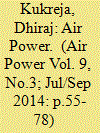

|
|
|
|
|
| Summary/Abstract |
From the end of the last century, it has been seen that the nature of war and armed conflict has been changing significantly, primarily due to two reasons, namely, the constantly evolving geo-political equations; and the unparalleled developments in technology, which were once considered to be a figment of the imagination. The world order today is changing at a rate that may be termed as illusory. The pace of the change may be comparable to the times that followed the defeat of Napoleon in 1815 and the defeat of Germany and Japan at the end of World War II in 1945. These changes, coupled with the advancements in technology, have significant implications on the nature of war, and, hence, national strategy, military strategy and force structure.
|
|
|
|
|
|
|
|
|
|
|
|
|
|
|
|
| 2 |
ID:
137831
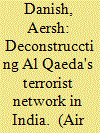

|
|
|
|
|
| Summary/Abstract |
Al Qaeda is characterised by a broad based ideology, a novel structure, a robust capacity for regeneration and a very diverse membership that cuts across ethnic, class and national boundaries. It is neither a single group nor a coalition of groups: it comprises a core base or bases in Afghanistan, satellite terrorist cells worldwide, a conglomerate of Islamist political parties, and other largely independent terrorist groups that it draws on for offensive actions and other responsibilities.
|
|
|
|
|
|
|
|
|
|
|
|
|
|
|
|
| 3 |
ID:
137827
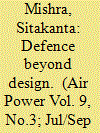

|
|
|
|
|
| Summary/Abstract |
The realm of ‘nuclear technology’ is amongst the most beguiling subjects of the human civilisation for the fact that words like ‘atom’ and ‘radiation’ have engendered both lasting fear as well as abounding hope in many. However, what is less certain is why it has entrenched such strong group (pro- and anti-nuclear) alignments. Fingers point towards the ‘risk’ associated with nuclear technology; but risk perception is a “combination of facts and fears, intellect and instinct, reason and gut reaction”; it is a ‘subjective’, not a purely rational and fact-based process. Therefore, any hasty response to a perceived risk may pose a danger by itself. Moreover, risk is calculated by multiplying the probability of the consequence by the severity of the consequence. On the other hand, the unrealised lofty goal of abundant energy through the nuclear route and a few nuclear disasters have given rise to public scepticism.
|
|
|
|
|
|
|
|
|
|
|
|
|
|
|
|
| 4 |
ID:
137824
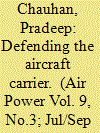

|
|
|
|
|
| Summary/Abstract |
It is axiomatic to state that India, as a sovereign independent nation, desires to use the seas for its own purposes while simultaneously preventing others from using them in ways that are to its disadvantage. The ‘ability’ to attain these twin objectives is what is known as ‘maritime power’, which comprises political, economic and military components.
|
|
|
|
|
|
|
|
|
|
|
|
|
|
|
|
| 5 |
ID:
137828
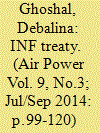

|
|
|
|
|
| Summary/Abstract |
Post the Cuban missile crisis, the arms race started to be viewed as a “necessary evil.”1 A predominant feature of the US-Soviet relationship comprised the efforts made by the two superpowers to indulge in nuclear arms reduction for strategic stability. The Intermediate Range Nuclear Forces (INF) Treaty was one such effort of the arms control measures. On December 8, 1987 President Reagan and General Secretary Gorbachev signed the treaty and agreed to a ‘double global zero’ in which both short range and intermediate range missiles would be eliminated.2 This paper aims to study the background of the treaty by briefly tracing the reasons for the signing of the treaty, the obligations of the treaty, the successes of the treaty, its limitations, and the implications of withdrawing from the treaty.
|
|
|
|
|
|
|
|
|
|
|
|
|
|
|
|
| 6 |
ID:
137823
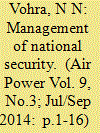

|
|
|
|
|
| Summary/Abstract |
The Pakistani Inter-Services Intelligence (ISI) has also been striving
to resurrect Sikh militancy in Punjab by supporting the establishment of
terror modules from among militants in the Sikh diaspora. The ISI is also
reported to have been pressurising Sikh militant groups to join hands with
the Kashmir-centric militant outfits.
|
|
|
|
|
|
|
|
|
|
|
|
|
|
|
|
| 7 |
ID:
137825
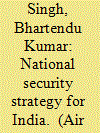

|
|
|
|
|
| Summary/Abstract |
Most great powers have a public document on the National Security Strategy (NSS), meant to navigate the country in anarchical international relations and secure its survival. Invariably, the NSS seeks a conducive strategic environment, identifies the strategic goals and delineates the methodologies for a national response along with resource management. The US, UK, France and Russia come with periodic updates of their NSS2 . China does not have a declared national security strategy but its Defence White Papers published every two years are alternate documents on national security.
|
|
|
|
|
|
|
|
|
|
|
|
|
|
|
|
| 8 |
ID:
137829
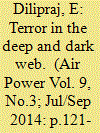

|
|
|
|
|
| Summary/Abstract |
Starting as a mere concept named “Galactic Network” by J.C.R. Licklider of MIT in August 1962, the ‘internet’ has in the past few decades revolutionised the way this world communicates. Having been technically nurtured in the Defence Advanced Research Projects Agency (DARPA) from early the 1960s to the late 1970s, the internet, i.e. the then ARPANET, has undergone various phases, starting with the sending of host-to-host messages with mere packet switching technology in extreme low speed (2.4 kbps – 50kbps) in 1969, to the advancement of the host-to-host protocol of ARPANET called “Network Control Protocol” (NCP) in 1970, to the introduction of ‘electronic mail’ service in 1972 for an easy coordination mechanism in ARPANET.
|
|
|
|
|
|
|
|
|
|
|
|
|
|
|
|
| 9 |
ID:
137830
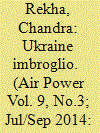

|
|
|
|
|
| Summary/Abstract |
The recent developments in Ukraine have once again brought the region to a critical juncture in international affairs. What started as anti-government protests soon transformed into intense ethno-political mobilisation with the demand for secession becoming contagious in eastern Ukraine. While analysts are busy examining the triggers for the intense protests, the need of the hour is to evaluate the failure of Kiev to address the underlying factors that have fostered the uprising of ethnic groups in Ukraine since its independence post Soviet disintegration in 1991.
|
|
|
|
|
|
|
|
|
|
|
|
|
|
|
|
|
|
|
|
|